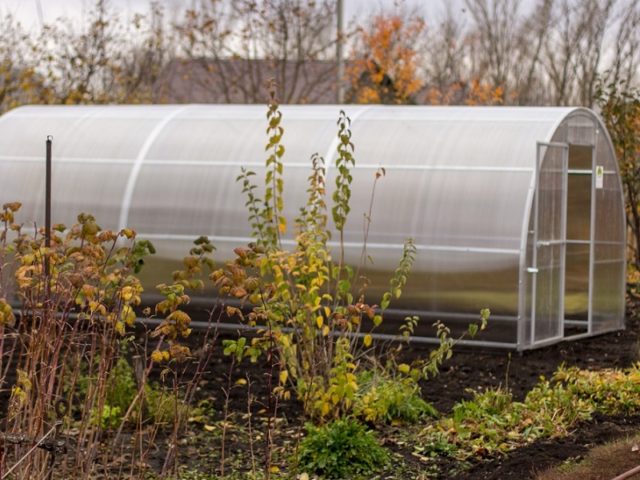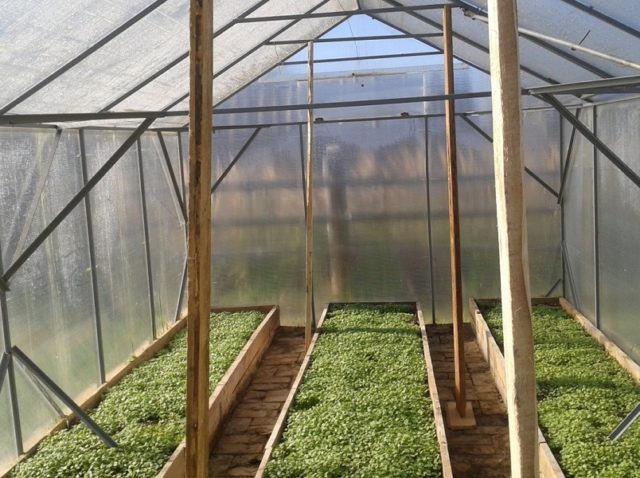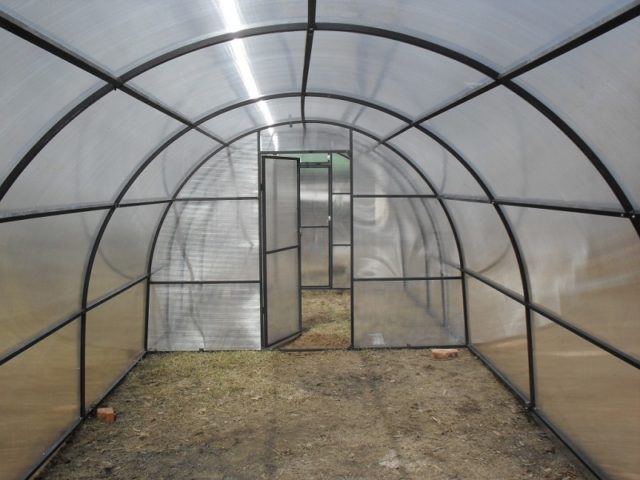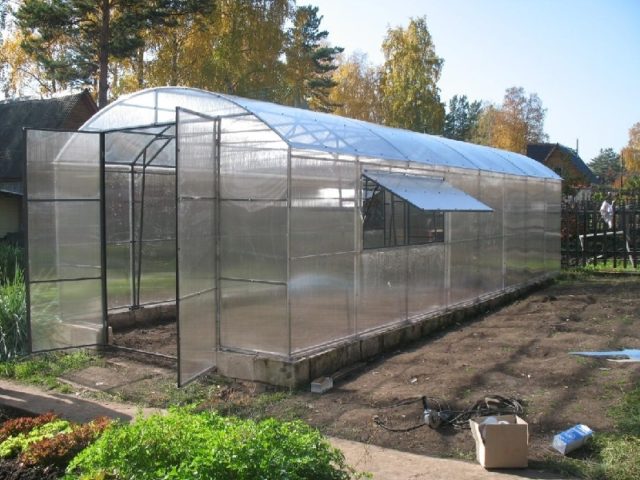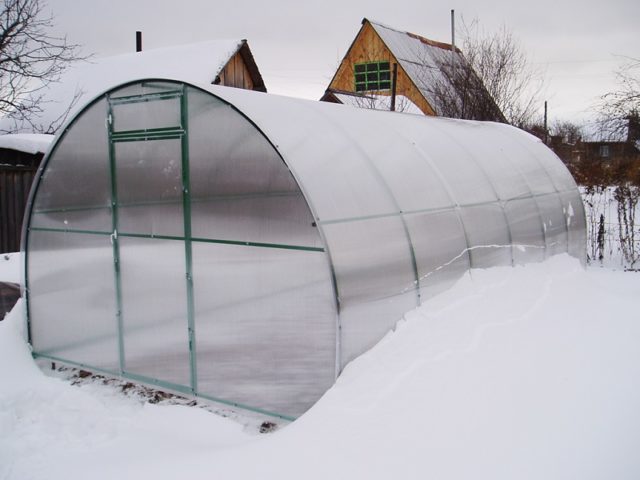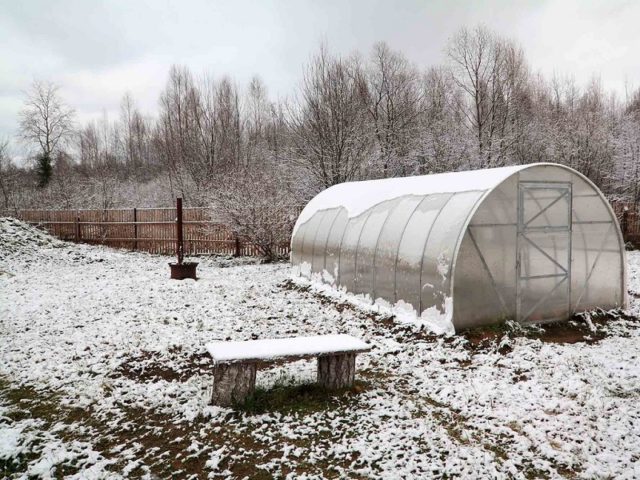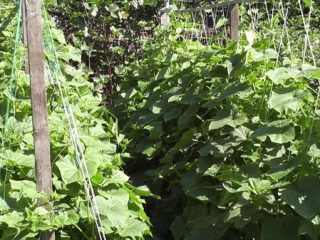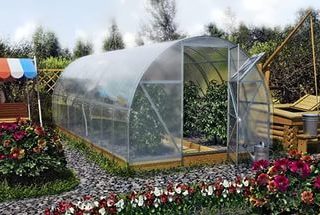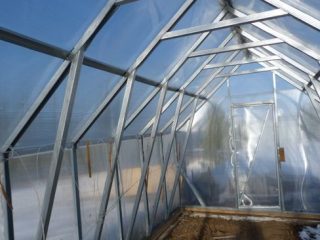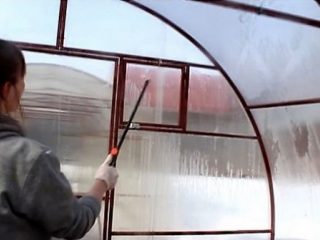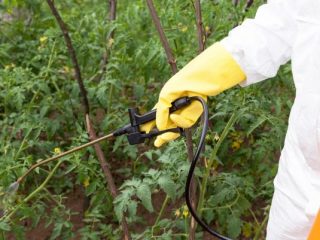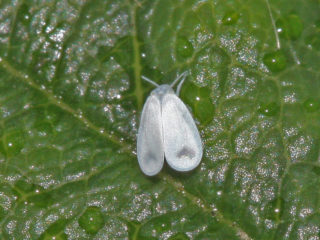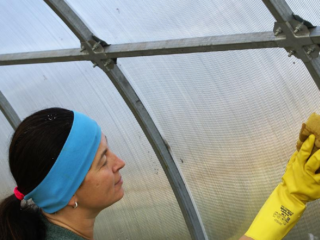Content
- 1 Work in the greenhouse in the fall after harvest
- 2 Preparing the greenhouse for winter in the fall
- 3 Greenhouse cleaning
- 4 Replacing or disinfecting soil
- 5 Processing a polycarbonate greenhouse in the fall
- 5.1 How to treat a greenhouse in the fall after harvesting
- 5.2 Treating a greenhouse in the fall against pests and diseases
- 5.3 How to prepare a greenhouse for winter: post-tomato treatment
- 5.4 How to prepare a greenhouse for winter: disinfection after cucumbers
- 5.5 How to prepare a greenhouse for winter: how to treat the frame and coverings
- 6 How to strengthen a polycarbonate greenhouse for the winter
- 7 Insulating a greenhouse for the winter
- 8 Preparing a greenhouse for winter: advice from summer residents
- 9 Conclusion
Many inexperienced gardeners and vegetable growers stubbornly adhere to the opinion that preparing a polycarbonate greenhouse for winter in the fall is a boring, useless waste of time. In fact, this is a very important event, since it is during this period that maximum soil treatment is required to remove small parasites and fungal spores, which, in the absence of proper agrotechnical treatments, will manifest themselves next year during crop germination. To find out how to properly prepare a polycarbonate greenhouse for winter, you need to carefully study all the recommendations presented and follow them.
Work in the greenhouse in the fall after harvest
Before you start processing the greenhouse in the fall, you need to read the instructions that will help you properly and efficiently prepare for winter and avoid fatal mistakes. The main types of work in the fall after harvest include:
- cleaning the premises from plant debris;
- carrying out disinfection of the frame and covering material;
- treatment with appropriate preparations for the prevention of diseases and pests;
- replacing soil with fertilizers and other necessary means;
- repair, strengthening of the greenhouse, which includes monitoring the strength of all elements of the building.
Optional work, which includes processing, replacement of equipment or its improvement, must be carried out as necessary. A full range of such events takes place every year in the autumn.
Preparing the greenhouse for winter in the fall
To find out how to treat a polycarbonate greenhouse in the fall, you need to arm yourself with instructions that tell you step by step about all the required processes:
- Cleaning the greenhouse building in the fall.
- Disinfection of greenhouse premises.
- Disinfection of the soil, digging it up, warming it up, loosening it, replacing the top layer of soil.
- Strengthening the frame and other work related to redevelopment or improvement of polycarbonate buildings.
Proper preparation in the fall will make it possible to use the premises for many more years and use it for your own purposes.
Greenhouse cleaning
Autumn harvesting should be done only after the entire crop has already been harvested. All above-ground and underground parts of annual plants must be removed and the beds must be completely cleared of anything that could interfere with cleanliness.
Disposal of plant waste consists of burning it or burying it in other areas. If no deviations were observed in the plant during the period of growth and development, and it was not affected by various diseases or pests, then its remains can be used to replenish the compost pit. There are also organizations that deal with the removal of such waste. Perennial plants can also be audited. They need to be examined for the presence of symptoms of the disease, ensure their absence, and remove all damaged specimens.
Replacing or disinfecting soil
After thorough cleaning, the stage of replacement and soil cultivation begins. This is a labor-intensive process that requires maximum effort. Many people neglect this point and in vain, since the quality and quantity of the future harvest depends on it. Therefore, it is necessary to replace the soil in the fall every year without exception.
First, you should treat the top layer with chemicals aimed specifically at treating the soil in the fall. Then remove the top layer no more than 15 centimeters deep. The soil can be taken to an open area of soil, poured under fruit and ornamental trees.
Then you need to think about how to replenish the greenhouse beds with soil. It is quite difficult to create ideally suitable fertile soil in a short period of time. There are two ways:
- Buy a certain amount of new fertilized soil, but not everyone has the opportunity to find a place where it is sold in large quantities and deliver it, although this method is more time-saving.
- Prepare it yourself, but to do this you need to know the condition of the soil and, depending on this, select the main components of the future soil.This also requires purchasing large quantities of fertilizers and mixing them correctly.
Everyone has the right to independently decide whether to buy ready-made soil, trusting professionals, or independently determine what means to use. In the second case, you can be completely confident in the quality of the new soil, but in the first - not always. Unscrupulous sellers may provide soil that was actively used last summer.
Before pouring a new layer in the greenhouse, treatment and disinfection with certain chemicals and fumigation with sulfur should be carried out.
Processing a polycarbonate greenhouse in the fall
Treating your greenhouse in the fall is very important. But before you start, you need to familiarize yourself with a set of measures that will ensure a good harvest next season.
How to treat a greenhouse in the fall after harvesting
Many people will find it difficult to prepare a greenhouse for the new season in the fall, but it is not recommended to ignore this process. In the fall, immediately after harvesting, it is necessary to prepare the soil and begin processing the structure itself. Procedures that need to be carried out in dry, cool weather include:
- complete cleaning of the polycarbonate greenhouse;
- general cleaning, removal of remaining fertile crops, weed;
- treatment of all surfaces from the inside;
- repair of the building if necessary;
- replacement of greenhouse soil, disinfection and soil treatment;
- strengthening of polycarbonate structures, insulation, lighting.
Maintaining consistency and obligatory completion of each item in the fall is the key to a rich harvest next year.
Treating a greenhouse in the fall against pests and diseases
Treatment of all greenhouse surfaces in the fall provides for getting rid of possible diseases and pests. Since microorganisms, cells that contribute to their spread, can settle on the walls of the room. Processing is carried out in several stages:
- Removing polycarbonate equipment from the greenhouse, removing above-ground and underground plant debris, digging up the soil.
- Wash away dirt from surfaces using a hose with a sprayer.
- Preparing a soap solution and washing the walls and ceiling with a sponge.
- Cleaning cracks and knots with a special brush.
- Dousing a polycarbonate greenhouse with clean water.
- Wiping the room with a dry cloth.
More information about the correct treatment of a polycarbonate greenhouse in the fall:
How to prepare a greenhouse for winter: post-tomato treatment
Preparing a polycarbonate greenhouse for winter after tomatoes should begin in October. In this case, you need to follow a certain sequence of actions:
- Removal of all vegetation. After the tomatoes grow, there are a lot of residues left, which are sometimes difficult to notice, but they must be gotten rid of without fail.
- Replacement of the top layer of soil. It could contain fungal spores and pest larvae, which in the future could settle on plants and lead to the death of the crop.
- Soil digging and disinfection. This procedure helps to finally get rid of possible problems for subsequent vegetation.
- Frame processing and coatings with sulfur and bleach.
When disinfecting and treating a polycarbonate greenhouse, you must adhere to all safety rules and carry out the procedure only in a protective suit.
How to prepare a greenhouse for winter: disinfection after cucumbers
Preparing a polycarbonate greenhouse for winter in the fall after cucumbers is practically no different from the previous system with tomatoes:
- spring-cleaning, reclamation of beds. Removing all vegetation, replacing the top layer, digging up the soil.
- Disinfection of the area. You should spend more time on this stage and use sulfur bombs, bleach or biological products.
- Greenhouse treatment made of polycarbonate. Washing the panels, which will allow snow to melt freely in the future.
In case of deformation of the structure, strengthen it, strengthen the frame, with a polycarbonate thickness of 4–6 mm.
How to prepare a greenhouse for winter: how to treat the frame and coverings
Preparing a greenhouse for winter involves careful treatment of the structure from the inside and outside. Rinse the metal and polyvinyl chloride frame of the polycarbonate greenhouse with hot water mixed with vinegar in a ratio of 1:0.05. It is better to wipe the wooden frame with a solution of copper sulfate (10%).
It is better to treat the polycarbonate coating with a solution of potassium permanganate. Watering must be carried out carefully, without missing a single centimeter both outside and inside. After treatment, create a draft and dry the structure.
How to strengthen a polycarbonate greenhouse for the winter
Preparing a polycarbonate greenhouse for winter includes a thorough inspection of the structure for damage and breakdowns. It is likely that they may simply be invisible. Corrosion and mold may be found on the frame. To strengthen the structure, you can use duplicate arches or supports.As a preventative measure, the frame must be periodically cleaned and wiped with special compounds. The covering material, in this case polycarbonate, also needs to be strengthened. Inexpensive options are produced with a thickness of only 4 mm. In this case, the building will not last even a year. It will be much more economical to use a thicker set from 6 to 8 mm.
In the future, when various breakdowns and defects are detected, you should immediately find out the cause of their occurrence so as not to encounter them again.
Insulating a greenhouse for the winter
Maintenance of a polycarbonate greenhouse in winter is also carried out, since the structure requires additional protection when cold weather sets in. It is necessary to prepare the greenhouse for winter in advance, so that during a sudden cold snap there are no problems.
Should I open the greenhouse for the winter?
It is necessary to close a polycarbonate greenhouse for the winter only if it is planned to grow various crops, since they require normal temperature conditions. And in the absence of such plans, you need to leave the door open.
Do you need snow in a greenhouse in winter?
One of the mandatory aspects of caring for a polycarbonate greenhouse in winter is the mechanical introduction of snow. Without it, the ground will freeze and it will be difficult to grow anything. When it warms up, the snow melts and is absorbed into the ground. This will moisten and prepare the soil for further planting.
How to insulate a polycarbonate greenhouse for the winter
Warming in the fall can be done in several ways:
- Foam glass. The material is quite stable and will cope well with excess moisture and visits from rodents. The only negative is the cost, since not every gardener can afford it.
- Sealing joints. Small holes are the main problem of heat loss, so sealing the joints will be useful in any case.
- Vestibule equipment. This will help regulate the temperature so that sudden cooling or warming does not affect the conditions inside the greenhouse.
The process of insulating a polycarbonate greenhouse is lengthy and quite difficult; moreover, the implementation of the idea is often impossible due to lack of funds. But still, you should not ignore this stage.
Preparing a greenhouse for winter: advice from summer residents
Before making preparations, you need to carefully understand all the processes and study the advice of those who have been doing this for many years:
- There is no need to be afraid to leave the structure open for the winter and bring snow in there yourself. This procedure will have a positive effect on the soil, moisten it and prepare it for further planting.
- To wash the polycarbonate coating, it is better to use soft sponges or brushes to avoid scratching it.
- It is worth periodically treating the frame so that various fungi or lichens do not appear on it, which are then difficult to get rid of.
- To warm the soil and get rid of microorganisms, it is recommended to water it with boiling water.
Proper preparation of a polycarbonate greenhouse for winter will allow the structure to be used for many years to come.
Conclusion
Preparing a polycarbonate greenhouse for winter in the fall involves many complex and time-consuming processes, but under no circumstances should it be neglected. Proper processing of the structure is the key to a high-quality, generous harvest in the future.
